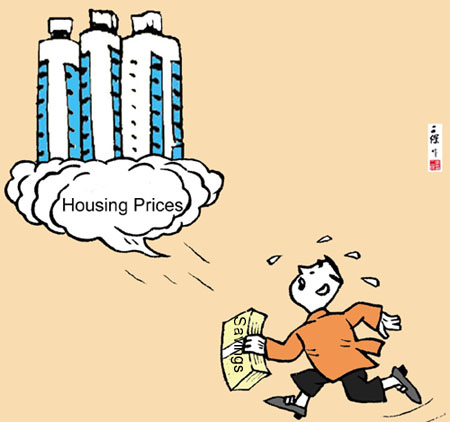A growing number of mainland residents plan to increase their savings as
opposed to increasing spending, a quarterly survey conducted by China's central
bank suggests.
About 36.8 percent of 20,000 respondents surveyed said "more saving" is a
better option at present than "more spending," up 2.2 percentage points from a
quarter ago, the People's Bank of China said on its Website yesterday. The
survey was conducted in 50 cities.
The increase in the number of people planning to save more ends two straight
quarterly decreases, the report said.

House
sales prices in August in 70 major Chinese cities rose by 5.5 percent
over the same period last year, according to figures released on September
13, 2006. Newscartoon/Li Erbao |
"The new
interest rate hike had a big effect on residences' trends for more saving," the
central bank said.
On August 19, the central bank raised its deposits rates, the first hike in
almost two years, with the one-year rate rising from 2.25 percent to 2.52
percent.
About 68.2 percent of respondents said they have deposits at banks, up 1.7
percentage points from the previous quarter.
The rate hike has also had a negative effect on the real estate market.
The central bank raised lending rates on August 19, the second hike in less
than four months. Though it also allows commercial banks to offer a 15 percent
discount on individual mortgages, up from the previous 10 percent discount, the
hike still hit real estate consumption.
About 17.5 percent of respondents said they plan to buy property in the next
three months, down 0.1 percentage points from a quarter ago.
Respondents also said savings accounts are more attractive than stocks.
Only 12.9 percent of survey respondents said they plan to buy more stocks,
down from a record high of 15.8 percent in the second quarter.
A report from the Shanghai branch of the central bank earlier this month
showed that yuan-denominated deposits in local banks rose in August following
the interest rate increase.
(For more biz stories, please visit Industry Updates)